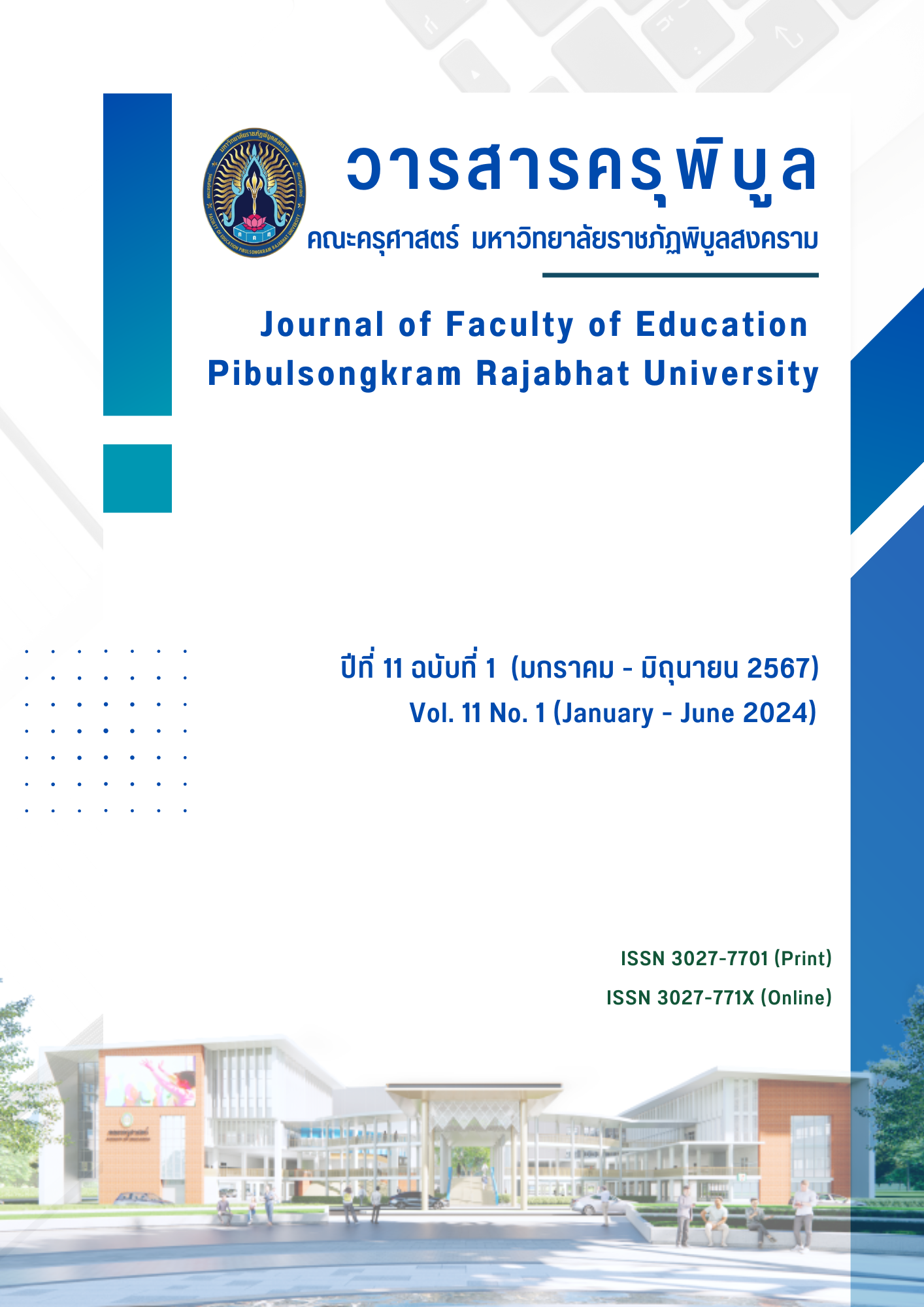THE STUDY ON THE COMPONENTS OF HOLISTIC STUDENT DEVELOPMENT OF HIGHER
Keywords:
Holistic Student Development, Component, Higher Education InstitutionsAbstract
Abstract
The purposes of this research are 1) to study the components of holistic student development of higher education institutions and 2) to analyze these exploratory components of holistic student development of higher education institutions. The samples for this research consisted of eight experts from higher education institutions and one representative from a business firm employing graduates, who were interviewed to gather information on the components of holistic student development. Additionally, 400 students from higher education institutions in the academic year 2022 participated, selected through stratified random sampling. The research instruments included semi-structured interviews and an opinion survey questionnaire on the components of holistic student development of higher education institutions. The reliability coefficient, determined statistically, was .986. Data analysis involved content analysis, average scores, standard deviation, exploratory component analysis using the Principal Component Analysis methodology, considering Eigen values, and component axis rotation using the Varimax Rotation methodology to identify the components of holistic student development of higher education institutions.
The findings of the research revealed that: 1) Experts gave six aspects of the components of holistic student development: social development; emotional development; spiritual development; intellectual development; physical development; and the development of media technology, including social media literacy. 2) Students from higher education institutions agreed with the defined statements regarding holistic student development at a high level (M = 4.03, S = .803). Upon item consideration, the average scores ranged from 3.91 to 4.22, with standard deviations between .784 and .864, indicating consistently high agreement across all items. The opinion level is high for all items. 3) For exploratory component analysis, it was found that there were two components of holistic student development: the component of thinking skills, learning, and socialization development, and the component of physical, moral, emotional, technological, and innovative development.
References
กิตติภูมิ มีประดิษฐ์. (2562). การประชุมวิชาการเครือข่ายพัฒนาบัณฑิตอุดมคติไทย เขตภาคกลาง เรื่อง อุดมศึกษาไทย หลังการเปลี่ยนแปลงไปของกระทรวง. มหาวิทยาลัยเกษตรศาสตร์.
กิตติญาภรณ์ ร้อยหมื่นไว. (2562). รูปแบบการพัฒนานักศึกษาตามหลักภาวนา 4 : กรณีศึกษาวิทยาลัยสยามบริหารธุรกิจ จังหวัดนนทบุรี. [วิทยานิพนธ์พุทธศาสตร์มหาบัณฑิต]. มหาวิทยาลัยจุฬาลงกรณ์ราชวิทยาลัย.
จิรประภา อัครบวร (2554). พัฒนาคนบนความยั่งยืน. สำนักพิมพ์จุฬาลงกรณ์มหาวิทยาลัย.
ธนชัย ใจซื่อ. (2563). แนวทางการพัฒนานักศึกษาภาคปกติตามกรอบมาตรฐานคุณวุฒิระดับอุดมศึกษา มหาวิทยาลัยราชภัฏมหาสารคาม. [วิทยานิพนธ์รัฐประศาสนศาสตรมหาบัณฑิต]. มหาวิทยาลัยราชภัฏมหาสารคาม.
นรีรัตน์ วิจิตรแก้ว. (2542). การพัฒนานักศึกษาตามความเห็นของอาจารย์และการประเมินตนเองของนักเรียน นักศึกษา นาฏศิลป์ชั้นกลางและชั้oสูง วิทยาลัยนาฎศิลป์กรุงเทพ. [วิทยานิพนธ์ศึกษาศาสตรมหาบัณฑิต].มหาวิทยาลัยศรีนครินทรวิโรฒ.
นพลักษณ์ หนักแน่น. (2555). การพัฒนากลยุทธ์การพัฒนาภาวะผู้นำของนิสิตนักศึกษาครุศาสตร์ศึกษาศาสตร์ระดับปริญญาบัณฑิต ระหว่างพ.ศ.2555-2564. [วิทยานิพนธ์ครุศาสตรดุษฎีบัณฑิต]. จุฬาลงกรณ์มหาวิทยาลัย.
เบญจพร จึงเกรียงไกร. (2558). การพัฒนากิจกรรมพัฒนาคุณลักษณะทางวิชาชีพสำหรับนักศึกษาพยาบาล. [วิทยานิพนธ์ครุศาสตรดุษฎีบัณฑิต]. จุฬาลงกรณ์มหาวิทยาลัย.
พระพรหมคุณาภรณ์ (ป.อ.ปยุตโต). (2544). พัฒนาการแบบองค์รวมของเด็กไทย. โครงการวิจัยระยะยาวในเด็กไทย.
ไพฑูรย์ สินลารัตน์. (2561). การศึกษา 4.0 เป็นยิ่งกว่าการศึกษา (พิมพ์ครั้งที่ 5). สำนักพิมพ์จุฬาลงกรณ์มหาวิทยาลัย.
วิจารณ์ พานิช. (2555). วิถีสร้างการเรียนรู้เพื่อศิษย์ ในศตวรรษที่ 21. มูลนิธิสดศรี-สฤษดิ์วงศ์.
วิชัย วงษ์ใหญ่ และมารุต พัฒผล. (2562). Meta skills กับการคิดแบบองค์รวม. บัณฑิตวิทยาลัย มหาวิทยาลัยศรีนครินทรวิโรฒ.
สำนักงานคณะกรรมการพัฒนาการเศรษฐกิจและสังคมแห่งชาติ. (2561, 13 ตุลาคม). ยุทธศาสตร์ชาติ พ.ศ.2561 – 2580 (ฉบับประกาศราชกิจจานุเบกษา).
สำนักส่งเสริมและพัฒนาศักยภาพนักศึกษา กระทรวงการอุดมศึกษา วิทยาศาสตร์ วิจัยและนวัตกรรม. (2562). ยุทธศาสตร์การพัฒนานิสิต นักศึกษาในสถาบันอุดมศึกษา พ.ศ.2560 – 2564 (พิมพ์ครั้งที่ 2). สำนักส่งเสริมและพัฒนาศักยภาพนักศึกษา สำนักงานปลัดกระทรวงการอุดมศึกษา วิทยาศาสตร์ วิจัยและนวัตกรรม.
อัจฉราวรรณ จันทร์เพ็ญศรี. (2558). การนำเสนอรูปแบบความร่วมมือระหว่างงานวิชาการและงานกิจการนิสิตนักศึกษาเพื่อพัฒนานิสิตนักศึกษาในสถาบันอุดมศึกษาไทย. [วิทยานิพนธ์ครุศาสตรดุษฎีบัณฑิต]. จุฬาลงกรณ์มหาวิทยาลัย.
อาณัฐ แพทย์วงษ์. (2550). แนวทางการพัฒนานิสิตนักศึกษาของสถาบันอุดมศึกษาในกรุงเทพมหานคร. [วิทยานิพนธ์ศิลปศาสตรมหาบัณฑิต]. มหาวิทยาลัยธุรกิจบัณฑิตย์.
อุทุมพร (ทองอุไทย) จามรมาน. (2532). วิธีวิเคราะห์องค์ประกอบ. (พิมพ์ครั้งที่ 4). สำนักพิมพ์จุฬาลงกรณ์มหาวิทยาลัย.
Cronbach, L. J. (1984). Essentials of Psychological Testing. (4th ed). Harper&Row.

Downloads
Published
Issue
Section
License
Copyright (c) 2024 คณะครุศาสตร์ มหาวิทยาลัยราชภัฏพิบูลสงคราม

This work is licensed under a Creative Commons Attribution-NonCommercial-NoDerivatives 4.0 International License.
ลิขสิทธิ์เป็นของคณะครุศาสตร์ มหาวิทยาลัยราชภัฏพิบูลสงคราม

